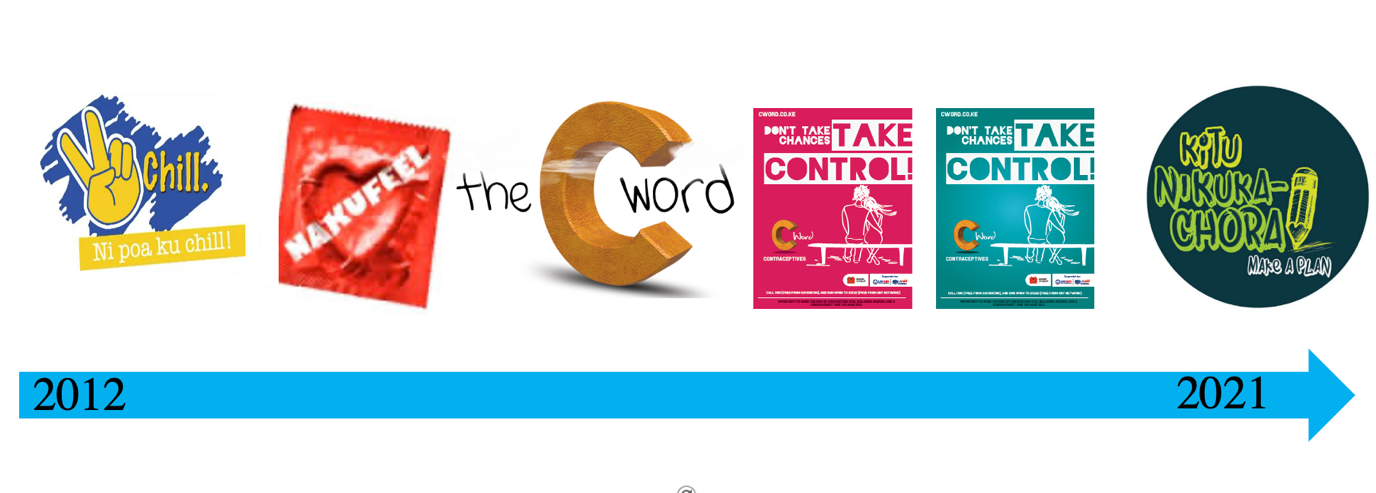Under Delivering Sustainable and Equitable Increases in Family Planning (DESIP), Foreign Commonwealth & Development Office (FCDO (2019-2025), PS Kenya is implementing the ‘Kipanga Maisha’: Life Plan campaign to shift the mindset on modern contraception and rebrand FP as an offering through targeted communication that will position FP in the minds of consumers as fun, inclusive, bringing happiness to the community and to each person in their way, enjoying Life. Key achievements: Contributed to the program’s cumulative CYPs for Year 1 to Year 5 Q1- 2,644,974 against a target of 1,930,432, a performance of 147%,
Kenya has been recognized for its strides in increasing its modern contraceptive prevalence rate (mCPR) and satisfying demand, including receiving an EXCELL award in 2015. With such a high modern CPR of 58% we are faced with a twofold challenge; sustaining use among the high CPR counties and increasing use in low CPR counties. Improvements in health outcomes such as an increase in mCPR do mask vast disparities and inequities in access, service provision and quality of care across the country.
Under Adolescent 360 (A360), Children Investment Fund Foundation (CIFF) and Bill and Melinda Gates Foundation (PS Kenya is implementing Binti Shupavu – a comprehensive approach to addressing adolescent’s SRH issues that consider the individual and societal factors that impact health outcomes. Key achievements: Reached 116,030 girls aged 15-19 years, with 68,029 adopting contraceptive use and 24,600 as continuing users; reached 1,664 with life skills and economic empowerment.

Under the USAID Health Communication and Marketing Program (2016-2021), PS Kenya developed and implemented the “The Choice is Mine” campaign to empower couples and women to be the final decision-makers on which contraceptive methods suit their lifestyles, working with local radio stations in 8 counties. (Nairobi, Kilifi, Kitui, Nakuru, Baringo, Kakamega, Kisumu and Migori[1]). The campaign involved radio talk shows that invited family planning experts weekly to engage with the public on air and educate the target audience on family planning issues. In the radio stations, the campaign organized expert forums where listeners could air their concerns on family planning, providing an opportunity for immediate feedback from the experts.

Under the USAID AFYA HALISI (2017 – 2020), PS Kenya strengthened the capacity of national, county and sub-county leaders and systems so they can enhance the efficiency of health systems to increase sustainability, prioritize populations most in need to increase equity, and scale-up high-impact interventions and practices to improve quality. PS Kenya supported the development and implementation of various campaigns, including:
Under USAID APHIA II HCM, (2007 – 2012), PS Kenya supported the MoH through the Division of Reproductive Health to promote contraceptive usage and increase Contraceptive Prevalence Rates (CPR) targeting both married women and youth. PS Kenya implemented several campaigns, including The C-Word Campaign, to educate the youth on contraception and get them to start discussing contraceptives with their sexual partners. The campaign used the term Contraceptives (‘C’ Word) instead of FP based on a consumer insight that unmarried youth do not relate to FP as they do not have families. PS Kenya rolled out the campaign through radio, print, TV, digital and social media. It used a link to a dedicated website where youth could get information on contraception and a free SMS and toll-free number where they could call for more information. The C-Word doctor responded to emails received. C-word interactive events were implemented through campuses, colleges or other forums where youth got FP information and IEC materials. The events integrated contraceptive education with other areas of interest to youth, such as Jijue – HIV Testing & Counseling; Jipange – Career Guidance; Rembeka – Beauty tips; and Healthy Me – Health and nutrition tips.
Femirange:
